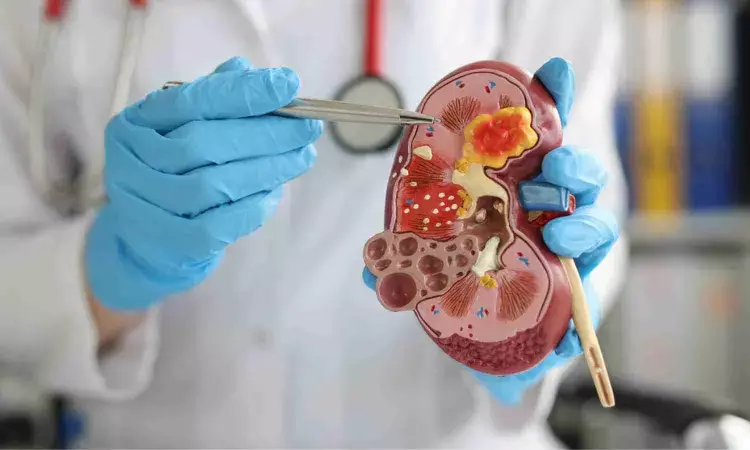- Home
- Medical news & Guidelines
- Anesthesiology
- Cardiology and CTVS
- Critical Care
- Dentistry
- Dermatology
- Diabetes and Endocrinology
- ENT
- Gastroenterology
- Medicine
- Nephrology
- Neurology
- Obstretics-Gynaecology
- Oncology
- Ophthalmology
- Orthopaedics
- Pediatrics-Neonatology
- Psychiatry
- Pulmonology
- Radiology
- Surgery
- Urology
- Laboratory Medicine
- Diet
- Nursing
- Paramedical
- Physiotherapy
- Health news
- Fact Check
- Bone Health Fact Check
- Brain Health Fact Check
- Cancer Related Fact Check
- Child Care Fact Check
- Dental and oral health fact check
- Diabetes and metabolic health fact check
- Diet and Nutrition Fact Check
- Eye and ENT Care Fact Check
- Fitness fact check
- Gut health fact check
- Heart health fact check
- Kidney health fact check
- Medical education fact check
- Men's health fact check
- Respiratory fact check
- Skin and hair care fact check
- Vaccine and Immunization fact check
- Women's health fact check
- AYUSH
- State News
- Andaman and Nicobar Islands
- Andhra Pradesh
- Arunachal Pradesh
- Assam
- Bihar
- Chandigarh
- Chattisgarh
- Dadra and Nagar Haveli
- Daman and Diu
- Delhi
- Goa
- Gujarat
- Haryana
- Himachal Pradesh
- Jammu & Kashmir
- Jharkhand
- Karnataka
- Kerala
- Ladakh
- Lakshadweep
- Madhya Pradesh
- Maharashtra
- Manipur
- Meghalaya
- Mizoram
- Nagaland
- Odisha
- Puducherry
- Punjab
- Rajasthan
- Sikkim
- Tamil Nadu
- Telangana
- Tripura
- Uttar Pradesh
- Uttrakhand
- West Bengal
- Medical Education
- Industry
Study of Sherpas highlights key role of kidneys in acclimatization to high altitudes

A study from a Mount Royal University physiologist and his team demonstrates the key role of the kidneys in acclimatization to high altitude, and illustrates another way that Sherpas are better adapted to high altitude ascent.
Results from the study were recently published in in the prestigious international science journal Proceedings of the National Academy of Sciences.
The paper, “Comparing integrative ventilatory and renal acid-base acclimatization in lowlanders and Tibetan highlanders during ascent to 4,300 m”, describes findings from an international high altitude research expedition to the Nepal Himalaya, funded by NSF (USA) and NSERC (Canada), where the team led by Dr. Trevor Day, PhD, studied the blood acid-base acclimatization responses to incremental ascent in lowlanders and Tibetan highlanders (Sherpa).
The team found that Sherpa participants had more rapid and larger magnitude blood acid-base acclimatization than lowlanders with incremental ascent to 4,300 metres. This study highlights the key role of the kidneys in acclimatization to high altitude, and illustrates another way that Sherpa are better adapted to high altitude ascent.
"With so many people now living and traveling to high altitudes, understanding integrated acclimatization and adaptation to high altitude in human populations is of increasing importance, particularly comparing lowlander to highlander populations,” explains Day.
High altitude exposure imposes a blood oxygenation and acid–base challenge, compensated by respiratory and renal acclimatization. The team assessed respiratory and renal acclimatization between unacclimatized age- and sex-matched groups of lowlanders and Tibetan highlanders (Sherpa) during incremental ascent to 4,300 metres in the Nepal Himalaya. Sherpa had a larger magnitude and more rapid time-course of respiratory and renal acclimatization, resulting in fully compensated blood pH at 4,300 metres, whereas lowlanders were still alkalemic.
“This study provides insight into the interplay of ancestry and physiological mechanisms contributing to acclimatization to high altitude, which may indicate selective pressure on ancestral Tibetan highlander populations related to renal function with acclimatization."
Insights from the research benefit physiology as a whole, and add new understanding about how different populations acclimatize to high altitude ascent.
Reference:
N.A. Johnson, J.A. Dickenson, B.W. MacKenzie, R. Isakovich, A. Kalker, J. Bouten, N.D. Strzalkowski, T.S. Harman, P. Holmström, A.J. Kunwar, N. Thakur, S. Dhungel, N. Sherpa, A.W. Bigham, T.D. Brutsaert, T.A. Day, Comparing integrative ventilatory and renal acid–base acclimatization in lowlanders and Tibetan highlanders during ascent to 4,300 m, Proc. Natl. Acad. Sci. U.S.A. 122 (1) e2412561121, https://doi.org/10.1073/pnas.2412561121 (2025).
Dr Kamal Kant Kohli-MBBS, DTCD- a chest specialist with more than 30 years of practice and a flair for writing clinical articles, Dr Kamal Kant Kohli joined Medical Dialogues as a Chief Editor of Medical News. Besides writing articles, as an editor, he proofreads and verifies all the medical content published on Medical Dialogues including those coming from journals, studies,medical conferences,guidelines etc. Email: drkohli@medicaldialogues.in. Contact no. 011-43720751


